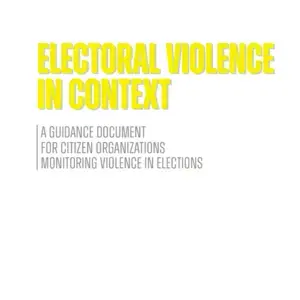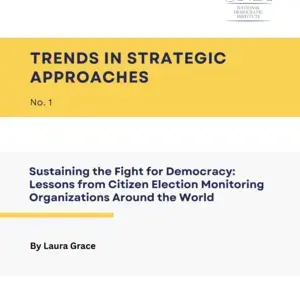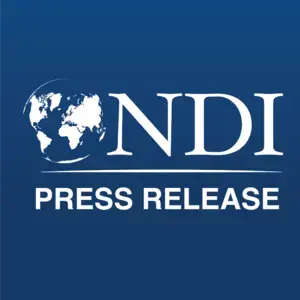Moldova Election Watch: Efforts Needed to Ensure Full and Informed Participation and Promote Fairness
October 14, 2020
Washington, DC -- Moldova approaches presidential balloting on November 1, 2020 with the demonstrated capacity to conduct democratic elections, yet facing urgent challenges, according to analysis released today by the National Democratic Institute. Moldova Election Watch highlights the impact of the covid-19 pandemic, as well as the need to address long-standing concerns about participation and fairness.
“This election comes at a pivotal time for Moldova,” said Sir David Lidington, chair of the Royal United Services Institute. “Global and domestic factors are straining the country’s institutions. A credible election process that reflects the will of voters would give the next head of state a stronger mandate to help the country navigate the hurdles ahead. It would also demonstrate Moldova’s commitment to a democratic course, which would in turn reinforce the country’s stability and sovereignty.”
The analysis of the pre-election environment released today is based on in-depth interviews conducted virtually from September 29 - October 9, 2020, by an NDI team that included Lidington, NDI Program Director for Elections Julia Brothers, NDI Deputy Director for Programs in Eurasia Katie Fox, NDI Regional Director for Programs in Eurasia Laura Jewett, and NDI Senior Country Director for Moldova Andrew Young.
The report found that Moldova has many democratic achievements to its credit. Yet public confidence in the presidential election process will require addressing the complex health challenges posed by covid-19, as well as some persistent issues related to electoral integrity. Key among these are ensuring the full and informed participation of voters living abroad and marginalized groups, such as persons with disabilities and ethnic minorities; providing a fair campaign financing framework; preventing voter intimidation and bribery, including among residents of Transnistria; and precluding the use of administrative resources for partisan purposes.
“Addressing these issues will require concerted efforts from all electoral stakeholders,” said Lidington. “More importantly, it will require the willingness of those in positions of power to prioritize democratic progress over partisan gains.”
The report makes 26 recommendations to improve Moldova’s electoral process. They include the following:
- The CEC, political parties, CSOs and online media outlets should identify avenues for providing credible election information to voters in Transnistria. Political and government actors should reject, denounce and sanction any attempts to intimidate, bribe or manipulate voters, including those from Transnistria. To preclude even the appearance of fraud, busing of voters from Transnistria should be avoided. Moldovan and international groups should deploy observers to the polling stations dedicated to Transnistrian voters on election day.
- The CEC, Moldovan embassies and the Ministry of Foreign Affairs and European Integration should coordinate to ensure that polling stations abroad open, comply with electoral requirements, and meet safety protocols.
- Before the next elections, the parliament should adopt draft electoral reform legislation introduced in July, incorporating feedback from civil society and the Venice Commission.
- Candidates and parties should pledge to reject bribery and intimidation of voters, as well as abuses of administrative resources in any form. Parties should discipline violators.
- Political parties and candidates should avoid using gender stereotypes and divisive language in their campaigns. Campaigns should reach out to marginalized communities, incorporating issues of their concern into the political discourse and expanding and diversifying their support.
- Election administrators, government authorities, election observers and other civil society groups should actively monitor, expose and denounce any use of hate speech in the electoral process.
- NDI will continue to monitor the overall election process through its conclusion.
###
NDI wishes to express its appreciation to the National Endowment for Democracy (NED) which has supported this analysis, as well as the Institute’s other ongoing election assessment efforts.
NDI is a nonprofit, nonpartisan organization working to support and strengthen democratic institutions worldwide through citizen participation, openness and accountability in government. NDI has organized more than 250 international observation missions or assessments to more than 65 countries, including Moldova. For more information about NDI and its programs, please visit www.ndi.org.




